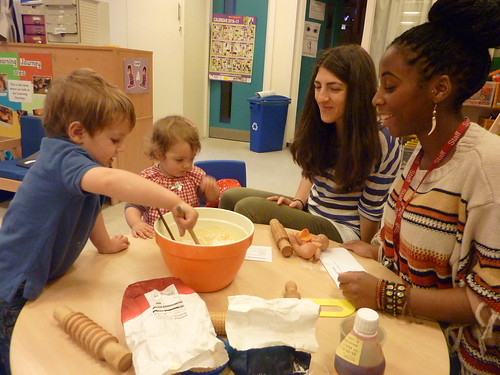The Power of Good Old Fashioned Care: Love, Chat and Adele
A few weeks ago Wave Trust in partnership with the DfE published its report Conception to Age 2 – The Age of…
August 6th 2012

At the recent summer NDNA conference, Professor Kathy Sylva revealed the findings of a research on parental engagement which she led with NDNA members (including some of our LEYF nurseries, as I am always keen to find ways to improve our parental engagement). The last piece of substantial research conducted in this area was done by Desforges and Aboucher in 2003. They had focused much more on needy parents and those parents who felt disempowered, lacked confidence and were failing to stimulate their children’s cognition and communication. These were generally parents with low aspirations for children’s future.
Since the expansion of the universal offer (which has a take–up of over 90%) and the increase of women in the work place, the range of parents coming to nursery has changed substantially. Nowadays, we have parents attending from all walks of life, and that brings with it changes in attitude and expectation. This was the very premise of this recent research, and I was keen to hear about the experiences of NDNA members across England with regards to a more modern understanding of parental engagement.
The first finding was that unlike Desforges, the largest and most powerful group of parents in this research were the well-educated, professional time poor parents. Unsurprisingly, however, the signs of satisfied and engaged parents – no matter what class, creed or social background – were feeling happy and content and able to have trust and confidence in the staff. According to the research, engaged parents have positive and reciprocal relationships, which allow open and grown-up communication, meaning parents can make suggestions for improvements but also listen to advice from staff; parents are equally willing to share information and work in partnership with the setting, are open to suggestions and remain keen to contribute.
The barriers to achieving this level of harmony focused a lot on the calibre of staff: parents were not pushing for more qualifications, but they did want staff who were mature, and with a level of emotional intelligence. They valued experience and an ability to communicate in ways that avoided jargon and unfriendly language. (Note to us all revising policies and procedures in light of the new EYFS!)
Interestingly, I think that was the point made in the Nutbrown Report; that higher level training and qualifications are more reliable ways of helping staff reach this level of competence (although, of course, only if they are taught by up to date, knowledgeable and interesting tutors).
What bothered staff was dealing with irritated or tired parents, and especially those who could not see the whole picture in the nursery and wanted action that was only self-serving. There was an acknowledgement that we needed training to improve some of the staff’s poor social skills which proves a barrier to communication. Interestingly, some of our LEYF staff recently completed the PEAL training as a baseline for understanding this critical relationship with parents; an experience that proved most worthwhile and so will now be built into the induction of all staff.
In summary, the research pointed to a number of solutions, and recommended that staff and settings:
Ultimately, if we are to get the important role of local nurseries out into the wide world, then parents are our best advocates. And so we need parents who are confident and empowered, along with staff who are secure about why and how they help parents balance high aspirations for their children with the importance of celebrating childhood.
A few weeks ago Wave Trust in partnership with the DfE published its report Conception to Age 2 – The Age of…
The Department for Education and the Department of Health have published the Government’s vision for the foundation years. In their own words… It is…
This week I went to visit Dara Hogan at Fledglings Nurseries, part of An Cosán, a community organisation and charity in…